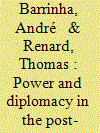| Srl | Item |
| 1 |
ID:
145772


|
|
|
|
|
| Summary/Abstract |
This article investigates the notion of ‘lateralisms’ and how various modes of engagement (namely bilateralism, regionalism and multilateralism) relate to one another. It begins with a careful analysis of the evolution of ‘lateralisms’ and their (in)compatibility at the global level, building on the existing literature from multiple research disciplines. The second part of this article focuses specifically on the European Union's (EU's) foreign policy approach. The author puts forward two main hypotheses. First, the EU has performed a rebalancing act between bilateralism and regionalism/multilateralism over the last decade in favour of the former, notably through the deepening of its so-called ‘strategic partnerships’. Second, this enhanced bilateralism is not necessarily compatible with other ‘lateralisms’, as it can at times undermine regional integration processes or the building of an effective multilateral order. The author eventually formulates some recommendations to ensure that bilateral partnerships are geared towards the strengthening of the multilateral fabric which remains the EU's fundamental and long-term objective.
|
|
|
|
|
|
|
|
|
|
|
|
|
|
|
|
| 2 |
ID:
172557


|
|
|
|
|
| Summary/Abstract |
It is becoming widely accepted that we have transitioned, or are now transitioning, from an international liberal order to a different reality. Whether that reality is different solely in terms of power dynamics, or also in terms of values and institutions, is up for discussion. The growing body of literature on ‘post-liberalism’ is used as an entry-point for this article, which aims to explore how the post-liberal transition applies to cyberspace. We explore how power dynamics are evolving in cyberspace, as well as how established norms, values and institutions are contested. The article then looks at the emergence of cyber diplomacy as a consequence and response to the post-liberal transition. As it will be argued, if cyberspace was a creation of the liberal order, cyber-diplomacy is a post-liberal world practice. What role it plays in shaping a new order or building bridges between different political visions, and what it means for the future of cyberspace, will constitute key points of discussion.
|
|
|
|
|
|
|
|
|
|
|
|
|
|
|
|